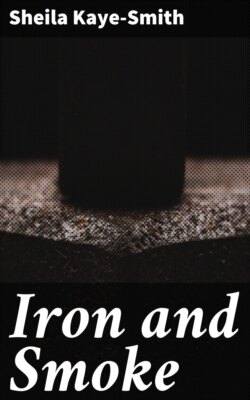Читать книгу Iron and Smoke - Sheila Kaye-Smith - Страница 6
На сайте Литреса книга снята с продажи.
§3
ОглавлениеTable of Contents
After dinner old Tom Bastow went to sit in his study. He usually went into the drawing room, to hear the ladies—that is, the young ladies, for their mammas had not their advantages—play and sing or even recite. “We sometimes have a regular concert after late dinner,” he would boast—“my little wee Jenny’s champion at her notes—as she ought to be, with a Frenchman out from Middlesbrough to teach her every Thursday.” But it was on little wee Jenny’s account that he sat in his study tonight, though he excused himself on the score of business.
In a sense it was true, and he sat in his study on a matter of business—no less than the sale of his only daughter Elizabeth Jane to Sir Humphrey Mallard, Bart., of Herringdales Manor, Heathfield, Sussex. Not that old Bastow regarded it as a sale. He could see plainly that the girl was in love—lovesick, it might be said—and the man if not so obviously stricken had for her true love and regard besides other qualities calculated to make a woman happy. The fact that the payment of money in large sums would inevitably accompany the romance merely bore out Tom Bastow’s conviction that money was the essential stuff of life and that nothing, not even romance, happened without it.
Mallard had told him that he would like a word with him later, and of course it was high time that this word were spoken. The suitor had not been any too brisk—a fortnight did not seem to her father the short, feverish time it had seemed to Jenny. The man had been his guest a fortnight, he was leaving the day after tomorrow, and had not yet proposed, though when he came to Slapewath Grange it had been understood that he came for that purpose. Jenny’s week in London had not been so merely frivolous after all.... Old Bastow had nearly committed an error of judgment in forbidding it, in substituting Leeds. His daughter could have found a richer husband in Leeds, but she would not have found a Title—at least an ancient and historic Title such as the Mallards’. Humphrey Mallard offered rank and honour in exchange for wealth—it seemed to Tom Bastow an eminently sound transaction.
He was pleased with his daughter. Jenny had always been what she should be—good and sweet. As a little tot in a Middlesbrough street she had played contentedly with the other iron-workers’ children, as a grown girl she had contentedly gone to school with the other iron-masters’ daughters. And now she was going to bring glory to the family by marrying a Sussex baronet, and allying the wealthy yet proletarian Bastows for ever with a Title. She had done all the best that could be expected of her, and her father blessed little wee Jenny in his heart.
He wished he could feel as pleased with his son. But lately Timothy had caused him some anxious thinking. Timothy had of course been destined for the firm of Bastow, Routh and Partners. He would learn the business from the beginning as soon as he had left Oxford, which would be at the end of the following year, and in a very short time he ought to be his father’s right hand, and ready to take his place when he was gone. But ... well the whole trouble was, he could never say exactly what should follow that “but.” Timothy had never objected to entering Bastow, Routh and Partners, he had never shown any leanings towards any of the professions, he had never caused his parents the slightest anxiety as to his way of living. Nevertheless, Bastow knew that his son did not really care two pins about the firm, that he accepted his future in it with tacit reluctance, that all his enthusiasm was given to ideas and causes that had no place in the world of the iron boom.
Perhaps it was his own fault, the old man reflected sadly, in having sent him to the Friends’ school at Eden-in-Cleveland instead of to a public school. He had thought it all over very carefully at the time, and had come to the conclusion that the moral tone of the great public schools was not all that it should be—and he had been told that the boys were not taught to work, but that more attention was paid to their prowess in the playing-field than in the school-room. Whereas, the Friends gave as good an education as Eton, and laid less stress on games than on character. So he had sent Timothy to the Friends’ school, and there unfortunately his son had learnt to be enthusiastic over lost causes, and had picked up all sorts of humanitarian and co-operative stuff that would smash the iron trade in a week if put into practice. Oxford had failed to undo the mischief—in fact Oxford too seemed to favour lost causes and humanitarian principles. Old Bastow told himself reluctantly that he had made a mistake. He should have educated the boy as he had educated the girl—according to the traditions of the world he had bought for them. Then Timothy now might be bringing him the same credit as Jenny.
There was a knock at the door, and with a sigh of relief he put away the thoughts that had begun to trouble him.
